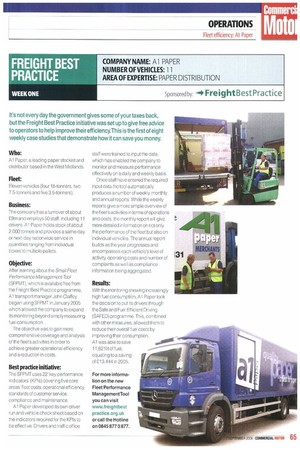It's not every day the government gives some of your
Page 65

If you've noticed an error in this article please click here to report it so we can fix it.
taxes back, but the Freight Best Practice initiative was set up to give free advice to operators to help improve their efficiency.This is the first of eight weekly case studies that demonstrate how it can save you money.
Who:
Al Paper, a leading paper stockist and distributor based in the West Midlands.
Fleet:
Eleven vehicles (four 18-tonners, two 7.5-tonners and five 3.5-tonners).
Business:
The company has a turnover of about E9m and employs 50 staff, including 11 drivers. Al Paper holds stock of about 2000, tonnes and provides a same-day or next-day nationwide service in quantities ranging from individual boxes to multiple pallets.
Objective:
After learning about the Small Fleet Performance Management Tool (SFPMT), which is available free from the Freight Best Practice programme, Al transport manager John Claffey began using SFPMT in January 2005 which allowed the company to expand its monitoring beyond simply measuring fuel consumption.
The objective was to gain more comprehensive coverage and analysis of the fleet's activities in order to achieve greater operational efficiency and a reduction in costs.
Best practice initiative:
The SFPMT uses 22 'key performance indicators (KPIs) covering five core areas: fleet costs, operational efficiency, standards of customer service, compliance and maintenance.
Al Paper developed its own driver run and vehicle check sheet based on the indicators required for the KPIs to be effective. Drivers and traffic office staff were trained to input the data, which has enabled the company to monitor and measure performance effectively on a daily and weekly basis.
Once staff have entered the required input data the tool automatically produces a number of weekly. monthly and annual reports. While the weekly reports give a more simple overview of the fleet's activities in terms of operations and costs, the monthly report will give more detailed information on not only the performance of the fleet but also on individual vehicles. The annual report builds as the year progresses and encompasses each vehicle's level of activity, operating costs and number of complaints as well as compliance information being aggregated.
Results:
With the monitoring showing increasingly high fuel consumption, Al Paper took the decision to put its drivers through the Safe and Fuel Efficient Driving (SAFED) programme. This, combined with other measures, allowed them to reduce their overall fuel costs by improving their consumption. Al was able to save 11,821lit of fuel, equating to a saving of 213,444 in 2005.
































































































































































































